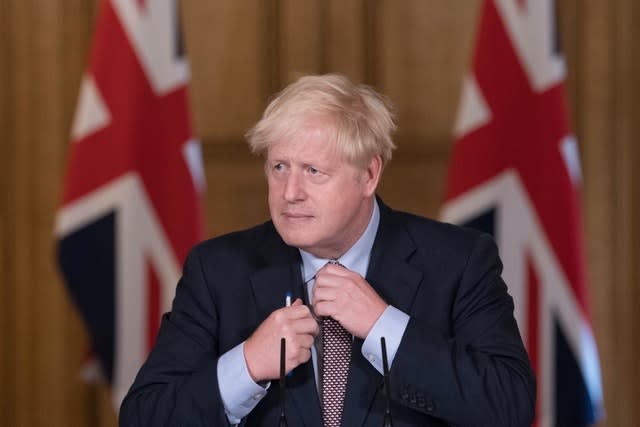PM tries to drum up support for his controversial Brexit Bill amid Tory disquiet
Boris Johnson has appealed to Conservative MPs to support legislation that could breach international law in overriding parts of his Brexit deal amid concerns of a rebellion.
The Prime Minister hosted a conference call with backbenchers on Friday evening to win backing for the Bill that caused Brussels to threaten legal action.
Mr Johnson told around 250 MPs that controversial clauses in the UK Internal Market Bill are “necessary to stop a foreign power from breaking up our country”, and maintained there is still a good chance of getting a trade deal with the EU.
With senior Conservatives planning to amend the legislation, he was also said to have warned them against going “back to the miserable, squabbling days of last autumn”.
But during the call in which there were connection issues and no questions taken by Mr Johnson further fall-out emerged from the EU.
Leaders in the European Parliament said they would “under no circumstances ratify” any trade deal reached if “UK authorities breach or threaten to breach” the Withdrawal Agreement.
Mr Johnson appeared not to have ended the disquiet within his party during the call, with senior backbencher Sir Bob Neill saying he was not reassured by the speech.
Sir Bob, who chairs the Commons Justice Committee and is tabling an amendment to the Bill which he says would impose a “parliamentary lock” on any changes to the Withdrawal Agreement, said he still contends it contains “objectionable” elements.
“I believe it is potentially a harmful act for this country, it would damage our reputation and I think it will make it harder to strike trade deals going forward,” he told Channel 4 News.
Downing Street insisted a post-Brexit free trade deal with the EU is still possible despite an increasingly bitter war of words with Brussels.
🇪🇺🇬🇧 By putting forward this Bill, the UK has seriously damaged trust between the EU and the UK. It is now up to the UK government to re-establish that trust.
My statement following today's extraordinary Joint Committee on the #WithdrawalAgreement👇https://t.co/fiRyTxVNQD
— Maroš Šefčovič🇪🇺 (@MarosSefcovic) September 10, 2020
The European Commission has given the UK until the end of the month to drop legislation enabling ministers to override provisions in the Brexit Withdrawal Agreement relating to Northern Ireland.
Following a stormy meeting in London on Thursday, the commission warned the UK was putting trade talks at risk and said it would “not be shy” of taking legal action.
The Prime Minister’s official spokesman however reiterated the Government’s position that the provisions Bill remained “critical” to the preservation of the Northern Ireland peace process.
He said the UK would continue to strive for an agreement and called on the EU side to show greater “realism”.
Amid the worsening atmosphere between London and Brussels, it emerged the EU had even raised the prospect that it could block exports of animal products from the UK once the current Brexit transition period comes to a close at the end of the year.
In a statement following the latest round of talks on Thursday, the EU’s chief negotiator Michel Barnier said there were “many uncertainties” about the UK’s animal hygiene regime.

He said “more clarity” was needed if Britain was to receive the “third-country listing” entitling it to export animal products to the EU.
On the British side, there was surprise at the comments as the UK continues to apply EU standards, although it is understood the issue has been raised previously in the negotiations.
A Government spokesman said: “It would be very unusual for the EU to go down this route and deny the UK listing.”
Meanwhile, Gordon Brown joined fellow former prime ministers Mrs May and Sir John Major in condemning the Government’s plan, describing it as “a huge act of self-harm”.
“You can’t expect to have a decent negotiation with the European Union if you start by breaking a treaty that you signed yourself and negotiated only a few weeks ago,” he told ITV’s Good Morning Britain.
Ireland’s Europe minister Thomas Byrne said that, far from protecting the Good Friday Agreement, the UK’s actions posed a “serious risk” to the peace process.
“It’s a totally unacceptable way to do business.
“This was a unilateral provocative act,” he told BBC Radio 4’s Today programme.

 Yahoo Movies
Yahoo Movies 


